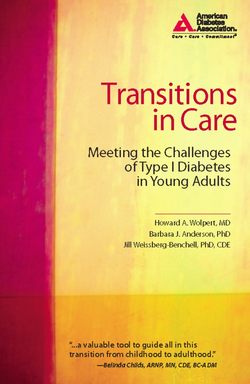Читать книгу Transitions in Care - Howard A. Wolpert - Страница 5
На сайте Литреса книга снята с продажи.
Prelude: Why We Wrote This Book
ОглавлениеAlmost anyone who has cared for someone in their late teens and 20s, through either parenting or treatment, knows that this is a unique and distinct phase of life. These are times filled with the tasks that map out the course of a life: the engrossing search for self and one’s place in society, the first steps toward career and financial independence, and deepening emotional involvements. The young adult is no longer an adolescent, but frequently is not yet completely independent from family support either. This is also a time of life when the person with type 1 diabetes assumes full responsibility for his or her own diabetes care and a period when the earliest signs of diabetes complications will often first present. The initiation of intensive therapy during this phase, when lifelong patterns of self-care behavior are being set, can have a significant impact on an individual’s risk for future complications.
Intensive insulin therapy requires discipline and sacrifice, not to mention responsibility and adequate support. Clearly, for the young adult who faces many competing demands for his or her time and attention, diabetes self-care may not always be a priority. The diabetes clinician needs to be aware that any perceived reluctance to intensify therapy on the part of the young adult patient may be because his or her focus is naturally drawn to the competing demands of education, relationships, and career-building. A successful relationship with a diabetes clinician will be founded in a long-term view of care, focusing primarily on a directly collaborative partnership that ensures that the young adult remains actively involved in his or her own health care. Clinicians can jump-start this process by envisioning their primary role as an agent for behavioral change. The clinician’s role should resemble that of a coach (who equips young adults with the skills needed to manage their diabetes) and a guide (who helps young adults make informed decisions about living with diabetes and works with the patient in developing a plan aimed at reaching optimal diabetes control). A priority in care is to ensure that patients remain invested in their self-care behaviors and engage in active problem-solving. Young adults who have these tools are less likely to fall into the trap of frustration, hopelessness, and disengagement from medical follow-up.
We have found that the needs of young adults with diabetes fall outside of the traditional focus of both adult and pediatric medicine; that is the reason for this book. Our clinical experience has taught us the importance of a thoughtful, systematic approach to assist young adults in their transition to healthy adulthood. In this book, we offer a framework for thinking about the important issues in diabetes care for young adults. The first section provides background information on the young adult period with which young adults with diabetes, their parents, and care providers should be familiar. After that, the book is written in two voices. One voice, introduced in the second and third sections and directed to young adults and their families and friends, focuses on the challenges and demands of living with diabetes and presents guidance in making informed individual and family decisions about diabetes management during this complex phase of life. The other voice, arising in the fourth section, provides a perspective on how the complexities of this developmental stage affect the health professional’s clinical role.
Although we have used different voices for each section, this hardly means that each part of the book is exclusive to that audience. We strongly encourage you, whether you are a young adult, parent, or care provider, to cover all of this material. Knowledge, particularly when concerning diabetes, is one of the most important tools in optimizing care, especially for a patient group that has been largely overlooked in clinical history.
Howard A. Wolpert, MD
Joslin Diabetes Center, Boston, MA Barbara J. Anderson, PhD Baylor College of Medicine, Houston, TX Jill Weissberg-Benchell, PhD, CDE Children’s Memorial Hospital, Chicago, IL
